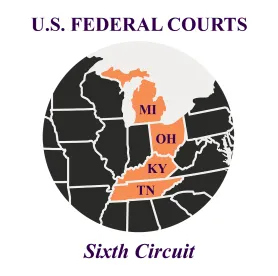The Sixth Circuit recently affirmed the rule that “the TCPA does not impose strict liability on a manufacturer simply because its products wind up on the face of an unsolicited fax advertisement; the manufacturer must independently fit the role of a ‘sender.’” Lyngaas v. Curaden AG, 992 F.3d 412 (6th Cir. 2021)(citing Health One Med. Ctr., Eastpointe PLLC v. Mohawk, Inc., 889 F.3d 800, 802 (6th Cir. 2018)).
In Lyngaas v. Curaden AG, a dentist sued Swiss toothbrush manufacturer, Curaden AG, and its US subsidiary, Curaden USA, for sending unsolicited faxes advertising their toothbrushes. 992 F.3d 412, 417 (6th Cir. Mar. 24, 2021). It was undisputed that the US subsidiary alone had designed and sent the facsimile advertisements and that the foreign parent played no part in and had no knowledge of them. Id.
The District Court held that the foreign parent could not be held liable for the fax advertisements due to its lack of knowledge, but on appeal the plaintiff argued that the FCC’s TCPA regulations acted to extend liability to any entity “whose goods or services are advertised or promoted” in a facsimile, regardless of knowledge. Id. at 424 (quoting 47 C.F.R. § 64.1200(f)(11)). The regulation the plaintiff relied upon defines a “sender” as “the person or entity on whose behalf a facsimile unsolicited advertisement is sent or whose goods or services are advertised or promoted in the unsolicited advertisement.” 47 C.F.R. § 64.1200(f)(11).
The Sixth Circuit rejected this interpretation of the relevant regulation, stating that the TCPA simply does not impose strict liability on manufacturers in the absence of at least knowledge of the offending advertisements. Lyngaas, 992 F.3d at 424. And since no one disputed that the foreign parent had no knowledge of the faxes and did not send them itself, it also could not possibly have “caused” the advertisements to be sent as required by 47 C.F.R. § 64.1200(a)(2). Id. “In short, some level of knowledge that an unsolicited fax has been sent is required for an entity to qualify as a sender” and to therefore be liable for violation of the TCPA. Id. “Because Curaden AG clearly lacked knowledge of and involvement in the fax advertisements, . . . Curaden AG was not a ‘sender’ and thus not liable under the TCPA.” Id. at 425.
The Sixth Circuit’s decision is in accord with the two other high courts that have addressed this issue. In FDS Rest., Inc. v. All Plumbing, Inc., the District of Columbia Court of Appeals rejected the application of strict liability in TCPA fax cases, holding that “a person or entity [could not be] vicariously liable for unsolicited fax ads transmitted by third parties . . . simply because that person or entity's products or services were advertised in the faxes. Rather, . . . in order for a person or entity to be subject to vicarious liability as the sender of a junk fax, the fax must have been sent on behalf of that person or entity.” 241 A.3d 222 (D.C. 2020). Similarly, the Seventh Circuit has concluded that “[n]othing in the statute allows the imposition of liability on an entity wholly unaware of the use of its logo in a fax.” Helping Hand Caregivers, Ltd. v. Darden Rests., Inc., 900 F.3d 884, 889 (7th Cir. 2018).
The Sixth Circuit also addressed whether faxes received by computers fall within the scope of the TCPA, concluding that they do. Id. at 426. “The TCPA defines a ‘telephone facsimile machine’ as ‘equipment which has the capacity (A) to transcribe text or images, or both, from paper into an electronic signal and to transmit that signal over a regular telephone line, or (B) to transcribe text or images (or both) from an electronic signal received over a regular telephone line onto paper.’” Id. (quoting 47 U.S.C. § 227(a)(3)). “This definition makes clear that a ‘telephone facsimile machine’ encompasses . . . ‘equipment’ that has the ‘capacity . . . to transcribe text or images,’ from or onto paper—as long as the electronic signal is transmitted or received over a telephone line.” Id. As the dissent pointed out, however, “[a] computer, on its own, does not have the capacity to do either. You need to hook it up to extra equipment first – a printer or a scanner.” Id. at 445. The Sixth Circuit’s conclusion is almost certainly not the last word on the issue, which is again pending before the FCC in an appeal of its In re Amerifactors declaratory ruling.





 />i
/>i

